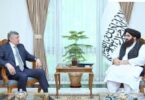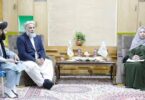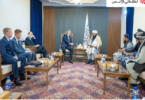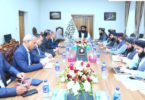KHOST CITY (Pajhwok): Since its construction 11 years ago and rehabilitation in 2018 with a total cost of $1.1 million, the Shiekh Zayed University teaching hospital in southeastern Khost province is yet to be made functional, Pajhwok Afghan News has learned reliably.
Some students and teachers of the Sheikh Zayed University fear the equipment donated by the United Arab Emirates (UAE) to the hospital may turn useless if the facility is not made functional soon.
The teaching hospital was constructed by the Afghan government 11 years ago at a cost of $800,000. It has a basement and four flours.
According to information available with Pajhwok Afghan News, the Sheikh Zayed Foundation spent another $320,000 on rehabilitation of the hospital building in 2018, raising the total cost to $1.2 million.
But the annual magazine of the university shows the rehabilitation cost as $349,000.
In addition, the Teaching Hospital received 22 containers of medical equipment in 2018, worth $8 million.
According to officials, the state-of-the-art medical equipment are only found only in a few hospitals of the country, but the equipment remains unused.
Dr. Taj Malook Samim, the hospital director, said the only reason the hospital could not be made functional was lack of funds.
He said 24 million afghanis budget was needed annually only for provision of initial treatment to hospitalized patients and this amount would rise ten times once specialized treatments were included.
“According to the government health strategy, this hospital should start functioning with 50 beds. The Ministry of Higher Education has provided no funds for the hospital. There is need for 200 million afghanis for the opening of the hospital, we cannot close the facility even for one day after its inauguration, and there is need for budget to ensure sustainability of services.”
Dr. Samim expressed concern that MRI, City Scan, angiography, PCR and 512 other types of medical machines could be lost if not used.
He said there were some problems in the building that needed rehabilitation. “The wiring system has not the capacity to afford the imported electricity and there is need for new wiring in the building.”
“The building is below standard, bathrooms are in terrible condition, they were destroyed and reconstructed, the electricity system is not functional. We recommended the wiring should be done again because the existing wiring doesn’t have the capacity,” he said.
Dr. Abdullah Qaderi, head of the Sheikh Zayed University Medicine Faculty, said the Teaching Hospital was vital for research work of medical students and teachers and specialization and stressed over the opening of the facility.
He said all the graduated doctors relied only on theoretical knowledge and they lacked practical work.
“If this hospital is not opened, the efficiency of the medical equipment will reduce and medical students will lack quality education, in addition, some teachers who went abroad for masters and PHD studies will have an opportunity to practice in this hospital and if it is not made functional they will forget everything,” he said.
According to the university officials, 53 employees has been approved for the hospital and 39 of them have been appointed. The appointed people include 19 specialist doctors and the remaining are administrative staff.
Information available with Pajhwok shows these individuals were appointed in 2011, 2013, 2014 and 2015.
The university did not provide official figures for salaries so far paid to the appointed individuals, but estimates show that based on the grades of the individuals, the Ministry of Higher Education (MoHE) has released millions in salaries to these individuals — a process still ongoing.
Awaz Khan, a fourth year student of medical faculty, said the Teaching Hospital was inaugurated many times but students got no opportunity of learning in the facility.
“We often ask the concerned authorities to pay attention to the hospital specially to the electricity and funding of the hospital, because people are not fully aware about this hospital,” he said.
He alleged the university administration did not play an effective role to make the hospital functional, adding the existing medical equipment will be lost if the facility was not made functional.
“There is need for drastic changes in the leadership of Sheik Zayed University, we have shared our concerns in this regard with the minister and lawmakers, but the ministry has taken no step to break the stalemate and improve the administration system,” he added.
Abdul Jabbar Jabarkhel, a doctor and civil society activist, also accused the university leadership of negligence in not making the Teaching Hospital functional.
“The university leadership is not competent, they did not make efforts as required, if they had so, we would have known that they took influential people, lawmakers and civil society activists to the ministry to make the hospital functional and show the people that the ministry is not cooperating,” he said.
Noor Shah Noorani, a member of the Provincial Council, also expressed concern and warned if the Teaching Hospital was not made functional, the available machinery would be lost.
Besides the university administration, he asked the MoHE to take necessary efforts to make the hospital functional.
“We want the MoHE to ensure funds for the hospital, protect the machinery and train people who will then educate our students,” he said.
Pajhwok also received documents about the theft of one container medical equipment from the hospital and later the transport officials claimed its recovery.
In this regard in 2018, the Parliament and Legislative Affairs Department, the Khost Attorney General Department, and the Khost Governor Office in separate letters had asked the Sheikh Zayed University administration to provide explanation.
Pajhwok waited for two weeks to get the viewpoints of University Head Hussian Gul Aryubi and his administrative assistants but they refused to communicate.
Aryubi in an aggressive tone told Pajhwok reporter in Khost City that he will never provide Teaching Hospital related information.
On Aryubi’s reaction, the Access to Information Commission (AIC) sent a letter to the MoHE complaining against Aryubi’s behavior, but the ministry did not answer the letter.
Talib Mangal, the governor’s spokesperson, said making the Teaching Hospital functional and addressing relevant issues was government’s top priority.
“There is need an overall assessment to take steps to address the existing issues in the facility,” he added.
Besides all the existing issues, the Teaching Hospital also lacks a particular code number through which foreign donations and assistance are attracted.
Available documents and the above report show that besides corruption, the incompetence of relevant authorities has deprived the SheikhZayed students from practical work as only theoretical education is not enough.






